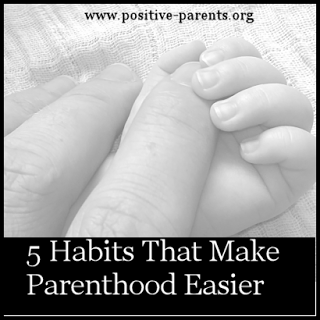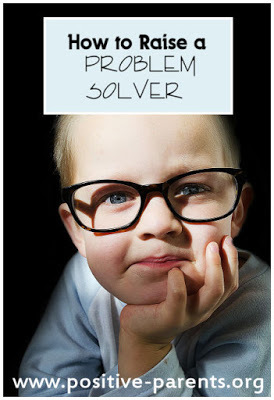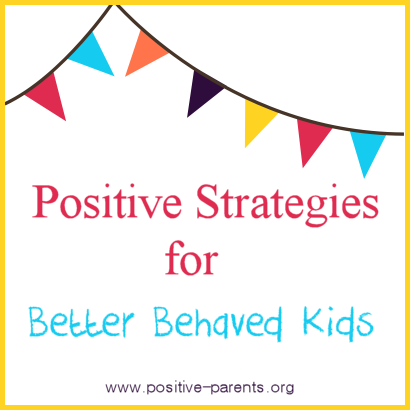Rebecca Eanes's Blog, page 12
June 25, 2015
5 Habits That Make Parenthood Easier

Raising children is no easy task. The habits we form now have a great impact on how our future days will go. Below are five habits that I've intentionally cultivated which I believe have made parenthood easier and more joyful.
Create a daily rhythm.While it isn't necessary, or even helpful, to be so rigid as to have every detail of the day planned out, it is very helpful to create a daily rhythm, or a flow to the day that children can generally count on. This daily rhythm creates a stable foundation, and knowing what comes next makes children feel secure and helps them transition more easily.
In addition, once the habit is well-formed, the rhythm becomes “the boss” in many ways. Children understand that after dinner it is time to bath, for example, and there is less push-back. A daily rhythm isn't only soothing for children but has been shown to also help parents feel more competent and confident.
Stick to the routine.Within the daily rhythm, routines make parenting easier. It isn't just knowing what to expect; it's also about connection points throughout the day. Sweet bedtime rituals and mealtime conversations serve to bring us back to each other in the midst of a busy life. Being connected and knowing what to expect are two important aspects that bring peace to our homes, and intentional, loving routines accomplish both.
Meet as a family every week.If you aren't already doing a weekly family meeting, I highly recommend beginning this tradition. Family meetings serve many purposes. They really help the family to function more smoothly as a unit. During family meetings, it's beneficial to talk about what went well that week, what didn't, what needs to be addressed, and plans for the upcoming week. When everyone gets to voice their opinions and ideas, the family bond is strengthened.
When families work on problems together, children learn how to work with others in a team, troubleshoot, and problem-solve. I also like using family meetings as a time to share fond memories from the past week and to share our appreciations and gratitude of each other. When everyone in the family feels heard, understood, and appreciated, you can bet that parenthood will be a little easier.
Be clear and consistent.Many parenting problems arise because we either aren't clear about the boundaries or we aren't consistent with enforcing those boundaries. Think of a “road closed” sign. It will stop you from going down that road, but unless there's a detour arrow, you're likely left stuck without knowing where to go next. Telling children what to stop doing is only half of discipline, and ending it there leaves things unclear. It's like putting up the “road closed” sign without detour arrow.
If we don't show them where to go from there, it's not likely they'll go in the direction we want them to go. They may, instead, find their own new path to the destination they're trying to get to, which is almost always getting a need met. Alternatively, they may crash through the sign and keep on going if the boundary isn't firm and held consistently. If we are both consistent in saying “you may not go that way” and clear in saying “here's the better way to go,” parenthood gets easier because it isn't an all-day marathon of power struggles.
Lean on your village.We aren't meant to do this thing alone, and yet I've heard many parents say how lonely they feel every day....continue reading at CreativeChild
Published on June 25, 2015 08:45
June 4, 2015
A To-Do List For A Better Life

How much does your to-do list bring you connection, joy, and contentment? What if it did? We all have things we need to get done every day, and if you're like me, you get some satisfaction in checking off the boxes. But at the end of the day, what has it all amounted to? Laundry – check. Work – check. Dishes – check.
The good thing about to-do lists is that they set intentions for us. They give us a clear plan and we can see just how productive we've been as we check off our lists. The bad thing is that if our to-do lists are filled with all work and no play, we may go to bed feeling accomplished but disconnected because our entire day was spent tending to chores and obligations. Being that connection is the heart of my parenting and life philosophy, it's better for me to be more intentional with my loved ones than the seemingly endless list of chores and responsibilities.
How can I make sure I'm building connection and still be productive each day and balance my responsibilities well? How can I end my day with a content heart in addition to a feeling of satisfaction at jobs well done? In addition to adding playful parenting into my daily chores, I create a separate to-do list each day, and checking off this list ensures that I've focused on the most important people in my life. This to-do list is a set of intentions designed to fill my family's love tanks and build a stronger bond with each of my loved ones.
I typically choose 3-5 intentions each day, and I'm consciously aware of them throughout the day as I set the list in a frequently visited area. When I have done what I intended to do, I check it off with a smile.
Below is a list of intentions you can choose from as you create your own Better Life To-Do List.
1. Notice one positive character quality about each loved one and speak it out loud today.
2. Show delight when my loved ones enter the room – when my children get up in the morning and when my husband gets home from work. Smile, greet them lovingly, and tell them I'm happy to see them.
3. Notice one positive behavior and commend my child for it.
4. Express appreciation for one thing that my spouse does today.
5. Spend at least 30 minutes on the floor playing with my child. Make sure the phone is not within reach and no distractions.
...continue reading at Creative Child

Published on June 04, 2015 10:46
June 2, 2015
Playful Parenting Every Day

Play has a wide range of benefits for children. Through play, children release energy, reduce stress, and learn about life. They learn problem-solving skills, exercise creativity, use their imagination, and master new concepts. For positive parents, play has another vital role – it connects parent and child, and we know that connection is the parenting key. When we take the time to play with our children, we connect on a deeper level. Play offers us the opportunity to gain trust, to laugh and release tension, and to get to know our children better.
As the world whirs around our heads at a dizzying speed each day, we find ourselves rushing through just to get the basics done. Who has time for play? After all, there are much more pressing things on our to-do lists, right? Here are some simple and fun ideas to incorporate connection-building play into your everyday routines.
Bubble Warrior or Princess
You have to run that dish water anyway, so turn this typically-mundane task into playtime by inviting your child alongside you with his or her favorite toys. Between washing plates, pick up an action figure and dunk it in the bubbles, then have a pretend battle in the water.
Bonus: Your child sees that doing dishes doesn't have to be such a chore.
Conquering Mount LaundryA stack of folded towels becomes a looming mountain filled with adventure! Can Dora reach the top in time to save Boots? Not if the sock monster reaches her first! Look out for the avalanche! Extra time it takes to get the laundry folded – about 10 epic minutes. Love tank refilled? Yes! That's how we get two birds with one stone.
Bonus: She'll probably be more cooperative about putting away her laundry after this.
The Hungry BroomMostly, the Hungry Broom is out for dust bunnies, but if he sees a child, that child better run! The Hungry Broom will chase after him, so he'd better run and hide. If he stays out of sight, the Hungry Broom will go back to eating dust bunnies. Alternatively, we play “I'm a little crumb” when I vacuum. Same idea, but my kids are crumbs that must run away from the vacuum! Giggles abound and the floor gets cleaned.
Bonus: You can let your child be the Hungry Broom while you run and hide. Just don't stay hidden too long. They will totally catch on to you if you do that. Trust me.
...continue reading at Creative Child

Published on June 02, 2015 11:46
May 27, 2015
How to Raise a Problem-Solver

We want our children to be able to recognize problems and have the initiative to tackle the issue and find a solution. Yet most conventional parenting practices involve parents solving the problem for the child. Methods such as spanking, time-out, and removal of privileges put the problem in the parents' hands, considering the problem solved when the punishment is issued. This causes parents to “police” their child's behavior continuously because the child isn't learning how to solve his own problems or correct his own mistakes.
I believe we need to give the problem to whom it belongs – the child. Otherwise, how will she learn to solve them without constant parental direction? Here are 4 questions to ask your child each time a problem arises that will help her grow to be a problem-solver.
What caused you to do this?This question gets children thinking about the relationship between their environment and their actions. “What caused you to hit your sister?” “What caused you to get a bad grade this semester?” “What caused you to leave your room a mess?” We want to get children thinking about cause and effect and understand how feelings affect their behavior so that they can learn to make better choices in the moment.
What was the outcome of your choice? This question serves two purposes. It teaches the child that their behavior is always a choice that they made (whether there was provocation or not, the choice was their's), and it builds empathy because they begin to see the affect their choice has had on those around them. “Look at your sister's face. How did hitting her make her feel? How do you feel about that?” “Would you have lost your baseball glove if you'd have kept things in their place?” “When you don't do your chores, how does it affect the rest of the family?” The point is to help them see their actions don't only affect them but others as well.
What could you have done differently?Here is where the child brainstorms better options or is taught better options by the parent or caregiver. Here's what this may look like so far:
“What caused you to push your brother down?”
“He took my toy. I was mad.”
“What was the outcome of your choice to push him down?”
“He's crying.”
“Yes, he's crying because that hurt him and made him sad. What could you have done differently?”
“I don't know.”
“Let's think about it. You could have asked me for help when he took your toy. You could have chosen to let him play with it and picked another toy for yourself. You could have taken a deep breath and asked him to give your toy back. Which choice will you make next time?"
How are you going to fix this?This question puts the responsibility for solving this problem squarely on the child's shoulders...continue reading at Creative Child


Published on May 27, 2015 16:49
The Changing Seasons of Motherhood

I remember the season when I had two tiny ones under my feet all day long, and the days were long. The nights were often even longer. It was a season filled with wild emotions, exhaustion, unbelievable joy, discovery, and what felt like a never-ending marathon of diaper changes. I was very often bleary-eyed from another night of waking with multiple children or teary-eyed from seeing my firstborn son give his brother a gentle kiss on his head while he slept.
I captured a lot of miracle moments in that season, but I also wished too many away. I used to wish they were out of diapers. I used to wish they'd just sleep through the night. I used to wish for a bit of “me time.”
There were nights when I would lie down with them until they fell asleep, and I would be entirely present in that moment, running my fingers through silky hair as I told them story after story. Those were beautiful nights.
Then, of course there were other nights when I just wanted to be done. I felt frustrated that they couldn't go to sleep on their own, and I questioned every parenting decision I'd made up to that point. Those were wasted nights. I accept grace for those nights. I am only human, after all. What felt like the season that would never end suddenly did.
I realized recently that I can no longer pick up my youngest son. He's too big. Too heavy. When did that happen? When was the last time I sat him down off my hip? My oldest son is nearly half way to adulthood now. Wasn't he just under my feet, asking me to play trains while I was trying to feed his baby brother?
If you are in a tough season, I want to offer you some encouragement today. I know it feels like she will never be potty trained or that he will never sleep through the night. I know you wonder if he will ever stop hitting or start sharing. You lie down at night weary from the day, unable to rest because you feel guilty for yelling.
You wonder if you are doing anything right. You are. You're doing just fine because you care enough to wonder. This season will pass, and while I won't tell you to enjoy every second because that is pretty ridiculous. I will advise you to be intentional about being present and capturing as many beautiful memories as you can, because in no time at all, those memories are all you will have of this season.
I'm in a brand new season now – a season of cub scout camp outs and baseball games. My big boys don't need me to get them to sleep anymore. Some nights I kiss them goodnight and go to my own bed, grab a book, and think of how relaxing and nice it is to have some time for me. Oh, but there are other nights, mama. Nights when I lie there listening to them giggle with each other in their room, and tears silently fall to my pillow because they don't need me to get them to sleep anymore. They need me just a little less than they used to. And that's okay – that means they're growing, but I would like for them to grow a bit slower.
These days I find myself making new wishes. I wish they were back in diapers. I wish I could still rock them to sleep .....continue reading at Creative Child


Published on May 27, 2015 16:43
8 Tips to Ignite Your Child's Love of Learning

Children naturally love to learn. Unfortunately, that love often gets stripped away by middle childhood as learning becomes competitive, directed, and overwhelming. Whether your child attends school outside the home or is home educated, these 10 tips will help ignite (or fan the flame of) your child's love of learning.
1. Let them see your love of learning! We know that we are our child's first teacher, and we have a tremendous influence on their worldview. Find your own passions and pursue your own interests. Talk to your child each day about something new you've learned or questions you plan on seeking the answers to.
2. Be enthusiastic about your child's interests. This is not only a wonderful way to connect with a child but to also fuel their passions. If you don't understand why your child loves a particular interest, get curious and ask questions. Discuss it in depth so that you really understand your child's view and feelings.
3. Read books - a lot! Reading aloud is especially beneficial as it increases vocabulary and comprehension, improves reading and listening skills, and sharpens your child's focus. Read lots of great classic literature and poetry which exposes your child to a whole wide world of wonder and beauty.
4. Allow plenty of free play. Today's children are often overscheduled and overwhelmed, leaving little time for free play and exploration. Not only does play do wonders for your child's brain , it also offers opportunity for your child to discover her interests. If a child is directed in school all day, and then spends the evening in more directed activities, there is nearly no time to discover what she really loves.
5. Expose him to a variety of experiences. Listen to different genres of music, show her different forms of art, read a variety of books, and play thinking games. Visit museums, see some live shows, and explore parks! When learning is a natural part of living and exploring, your child can't help but love it!
6. Focus on the process, not the outcome. Maybe she's really interested in dance, but struggles with getting the steps down. Let her know that trying her best and having fun matters more than dancing perfectly. Be a supportive encourager, but don't push too hard. It can be difficult not to get caught up in our own dreams and goals for them, which sometimes leads us to push when we should let go. Be mindful of which goals are theirs and which are yours....continue reading at Creative Child

Published on May 27, 2015 16:29
35 Things Positive Parents Can Do to Reduce Sibling Rivalry

I am delighted to welcome Sumitha Bhandarkar to Positive Parents today. Sumitha is the creator of A Fine Parent, one of my favorite resources!
************************************************************
As parents we all have certain dreams for our children. We want them to be happy. We hope they will be kind, gentle and well-liked. We wish for their positive growth and success. Equally important, parents with more than one child dream that the kids will grow up to be friends for life – supporting and being there for each other even after we are long gone. So, when we see them squabbling and bickering all the time instead of playing together blissfully (like we had fantasized), it’s a little unsettling. And tempting to rage on, punish or in some other way force them to get along. That never really works though, does it? You can’t force two (or more) people to like each other and get along well simply by dictating they should. So, what can we parents do then? I’ve put together a list of 35 simple things below that we parents can do to encourage our kids to get along better and establish a nurturing sibling bond that stands the test of time. These are great ways to positively and gradually alleviate sibling rivalry. Try some of these and see how it goes –
Avoid comparison between kidsCommit to a blame-free householdEncourage kids to find win-win solutionsAvoid labeling the kidsCelebrate each child’s individual successes separatelyMake failure palatableEncourage teamwork – be it with chores or at playMake it a point to spend some one-on-one time with each childDo as many things together as a family as possible (grocery trips, visiting extended family, volunteering etc.)Institute zero-tolerance policy towards unkindness, name-calling, being hurtful to each other, etc.Be respectful towards the other parent – kids do pick up a lot from how we treat others in our livesTeach kids to set, and respect, each other’s boundariesDo not interrupt happy playHave a couple of games stashed away that they love to play together, for times when they start to drive each other up the wallCommit to non-punitive positive parenting – if they see you punishing them when they are wrong, they will fall back on “punishing” each other when they feel slightedAcknowledge often how lucky you are to have each otherEncourage enthusiastically when you notice kids helping each otherBuy material things based on need (just because the child who joined soccer gets a new pair of soccer shoes does not mean the other child who is not interested in soccer should get it too), but lavish love unconditionallyCreate memory books with happy pictures and handwritten notes that you can look at on days when things go downhillCreate a gratitude jar where kids leave notes for siblings (and parents!) when they are happy with something the others have done for them. Mark a special day (eg. Valentine’s day) to read the notes out loudLet kids help with household chores, home improvement projects, gardening etc. Everyday moments of doing things together strengthens the bondsEstablish the rule of repairs – if one child hurts the other, intentionally or accidentally, he must do what he can to repair the situation. Don’t insist on (empty) apologiesWhen one child is hurt let the other kids help with the healing (even if they are responsible for the hurt, particularly if they are responsible for the hurt)Make sure each child has some physical space which is all their own, even if it is a small space at the corner of the deskTeach them to recognize their own strengths and live up to it, so they can be proud of each other’s accomplishments, without feeling pressured to live up to the other person’s strengthsTeach them good listening skills so they can be supportive of each otherMake sure every child has a voice, and their voice is heardTry to have at least one meal together as a family where each child is acknowledgedTeach them to disagree with each other and negotiate respectfullyEncourage games that require them to work with each otherFor competitive games, whenever possible, pit them together against you (the parents)Discourage tattling or telling on each other, unless it is a real emergencies. Help them see what constitute as real emergencies and teach them to sort the rest out by themselvesEncourage them to get things out in the open and communicate, rather than harbor misgivings and grudgesWork towards improving the emotional intelligence of each childEstablish a daily bonding routine – eg. Kissing each other good night every night, or a hug goodbye each day before they go to school etc.While all these will help alleviate sibling rivalry, it is just not possible to entirely eliminate it. Conflicts are a part of day-to-day life and the best we can do is teach kids to handle these conflicts effectively. Here is an infographic on how to deal with sibling rivalry effectively that discusses more ideas about conflict resolution and if/when you should get involved when conflicts arise. (You can download a free printable version here).

About the Author:
Sumitha Bhandarkar is the creator of afineparent.com, an exclusive community for parents who believe that great parents are made, not born. If one of your life goals is to be a better person and a better parent, she invites you to join her and the A Fine Parent community in their slow and steady quest for personal and parenting excellence.
Published on May 27, 2015 16:10
May 6, 2015
Positive Strategies for Better Behaved Kids

Children, like all human beings, behave better when they feel good about themselves and the world around them. As a social species, we all need to be seen, heard, understood, loved, and connected. When those needs are met – when our hearts are content – we all do better.Think about a few times when you weren't on your best behavior. Maybe you yelled at your children or said some hurtful words to your partner. Chances are, one or more of those needs weren't being met for you at that time. As parents, we can proactively foster good behavior by being intentional about seeing, hearing, understanding, loving, and connecting with our kids.
Stop and See Take some time every day to really look at your child . Notice her trying to do things on her own. Notice how he shared a toy with his sibling. Comment on what it is that you see.
“I saw you give your truck to your friend to play with. That was so kind.” “I love the outfit your picked out for yourself today! What nice colors!”
We are so quick to see and comment on what they do wrong. If we can get into the habit of being just as quick at seeing and commenting on what they do well, we will see them blossom.
Listen Children chatter all day long, and believe me, I know sometimes you just want to tune them out. Their latest video game achievement or another rendition of “Let It Go” isn't the most exciting for us to hear, but it's important to them. Take the time to hear what they have to say, because you'll really want to be in the loop in a few years, and you want them to know you'll listen.
Empathize It can be oh-so tempting to brush off a child's seemingly over-the-top emotional waves. “It's not that big of a deal!” or “There's no reason to cry about it!” are common responses, especially when the trigger of their upset seems so trivial to us, like the wrong sippy cup. I think we are afraid of creating little drama kings and queens if we show empathy for big feelings that well up over small matters. But, the truth is that the feelings are going to well up either way, and while we don't have to change the cup, we can at least let them know we understand those feelings - because certainly we have felt them too at some point. In fact, talking about them is a great way to teach emotional intelligence .
Speak Their Language Have you heard of the Five Love Languages for Children ? They are physical touch, words of affirmation, quality time, gifts, and acts of service. While all of these communicate love to every child (really every human!), each person has a primary love language, one in particular that really speaks love to them. Once you know their primary love language, you can make adjustments to fill your child's love tank. For example, my oldest son's primary love language is words of affirmation, closely followed by quality time. With that knowledge I was able to put more intention into affirming words and finding ways for us to spend one-on-one time together, which really improved our connection.
Make Connection Top Priority Connection is the parenting key. Connecting with your child engages the upper brain where reasoning, logic, and empathy take place. The result is a better behaved child, who wants to please you because you're so close. Looking for ways to connect? Read this article for 10 ways to connect with your child.
If poor behavior is a problem, take the one month challenge. Commit to seeing, hearing, understanding, showing love, and connecting with your child every day for one month. I think you'll be amazed at the positive changes you see!

As seen at Creative Child Magazine

Published on May 06, 2015 20:23
April 29, 2015
Why I'm Not Toughening Up My Children

A common theme I've noticed in the parenting community in my 5 years of running a popular Facebook parenting page and blog is that many parents are very concerned about “preparing children for the real world.” I get that. We are living in a harsh and oftentimes cruel world that does not revolve around my child or yours. So, it seems to some that the best way to prepare them for the harsh realities of the world is to let them face harshness in childhood. This will toughen them up and make them ready. It sounds like a reasonable plan, but don't count me in.
The truth is, I don't have a one-size-fits-all plan. I can't make blanket statements like, “I will never bring my child his forgotten lunch” or “I won't save him from disappointments in life.” My children are unique individuals at developmentally different stages, and I think that's the missing equation in most parenting “formulas” or “methods.” All of our children are unique individuals, and we have to treat them according to their needs, personality, and stage of development, not by hasty generalizations about what makes children prepared for adulthood.
Let's look at how development and personality come into play:Because I understand that executive functions are not fully developed in a young child, I would certainly take a forgotten lunch to school for my 8-year-old, if I was able to do so, and not fear that he would need me to bring him lunches forever. My frontal lobe is fully developed, and yet I forget things sometimes. I hope that my family is courteous enough to be there for me when I need them, and so I will be there for them. Allowing him to go hungry or be forced to eat food he dislikes might make him remember his lunch, but he's going to also remember the lack of courtesy and kindness shown to him.
If it's the fourth time this week my 8 year old forgot his lunch, then we need to assess what the problem is and find a solution. I don't allow problems to go unsolved, but the solution doesn't have to leave anyone feeling helpless, alone, unheard, or unloved.
Because I understand that one of my sons is highly sensitive , I will not let rude words said to him go unchecked, and I will not let him go undefended. Words hurt him more than they hurt the average child. He soaks them in, deep down into his being, and sitting idly by while another child on the playground says hurtful words isn't going to teach him to “deal with it.” I will practice with him over and over again how to deal with playground bullies and even rude adults who show no respect to children, and if a situation arises where I see he is having trouble, he can count on me to come to his aid. I would hope someone would come to mine.
Will I always come to the rescue?Not always. ...continue reading at CreativeChild

Published on April 29, 2015 12:03
April 23, 2015
Raising Happy Siblings - A Q&A with Dr. Laura Markham

It is my privilege and honor to welcome Dr. Laura Markham to positive-parents.org today. Dr. Markham's page, Ahaparenting, was the resource that turned my life around several years ago. She has been a continual source of inspiration and wisdom to me on my own parenting journey. Her book, Peaceful Parent, Happy Kids, stays by my bed for reference, and her new book, Peaceful Parent, Happy Siblings, is sure to join it there.
A couple of weeks ago, I asked my Facebook page readers to submit questions about siblings to Dr. Markham, and I randomly chose 9 of those to submit to her. Today, she has answered those questions for you, and I'm happy to share with you her gentle wisdom.
1. My oldest daughter (6) and second daughter (3) often fight as siblings do. My concern is that the older can throw a huge tantrum and the younger will just give in to whatever the older is wanting. How do I encourage the younger to have a voice and the oldest to calm herself and be more thoughtful, or at least willing to work towards a collaborative solution? - Kari S.
This is a very common dilemma. When they get into a spat, you can restore safety and validate both positions, by saying "Wow! I hear loud voices....It sounds like you two are having a hard time....Can you calm down and tell me about it? Let's work together to work this out."
Then, your oldest will explain why she is right, and you can acknowledge her view: "So you think you should play the game this way."
When your youngest "gives in" you can coach her to stand up for herself: "A few minutes ago, it sounded like you really wanted to play the game a different way....It's okay to disagree....Everyone is allowed to have their own opinion...We can work it out....Can you tell your sister what you want?"
With you there, the older sister will listen to the younger along with you. Then you acknowledge her view, just as you did her sister's: "So you think you should play the game that way."
Then, you define the problem: "So we have two girls who want to play together -- that's great! But you have two different ideas of how to play the game. What can we do to solve this?"
Then, you take them through the problem-solving approach that is outlined in Peaceful Parent, Happy Siblings. The short version is that you help them brainstorm and agree on something that works for both of them.
Of course, to make this work, you have to stay calm yourself, and resist acting like your older daughter is wrong!
2. Our second child is due in July, and our first daughter will only be 17 months, still a baby herself. How can we ensure that she does not feel abandoned or replaced, that we continue to meet all of her needs, and that our bond with her stays as strong as ever, while also ensuring that she creates a strong bond with her new sibling? - Nancy S.
The first step is remembering what you know now -- she is still a baby herself. She will look very big compared to the new infant, but she really will still be a baby, and deserves your nurturance.
The second step, before the baby comes, is to be sure that your little girl is comfortable with both parents. There will be times when you can't put her to bed, for instance, because you have to be with your infant. It's also a good idea before the baby comes to prepare a stash of special sensory bags and boxes for her, that you can pull out when you sit down to feed the baby. Most new mothers say that feeding time is when their older child becomes unmanageable, so its worth it to have plenty of simple distractions ready, so you can rotate through them.
Once the baby is born, try to make sure that your daughter gets time with both parents. So feed the infant and hand him to another adult, if you can, and spend some time connecting with your oldest. If you wear your baby, you will still have two hands free for your oldest. And of course, you can also wear your 17 month old, when she just needs some connection time, and you need two hands to change the baby, for instance.
(There is so much more to say about this topic; it takes up three chapters of my book, Peaceful Parent, Happy Siblings.)
3. I am a mom of 4 (ages 2, 4, 6, 8). I'd love any tips on gentle parenting in the moments when all 4 have big feelings happening. Or when one is having a "big" problem that requires immediate attention (bleeding, sick, etc) and another is demanding attention for a "little" problem (can't get a marker open, can't find the purple sock, etc). - Lindsay F.
You have my total admiration. I can't imagine having four children that close in age. I think the only way to prevent constant situations like you're describing is to do preventive maintenance. That means that every day you schedule in some one-on-one time with each child, so they have more internal resources to cope when things are tough.
But when you do find yourself in the situation you're describing, the most important thing is to stay calm yourself. Often, we get so anxious and overwhelmed that we start snapping at the kids: "Can't you see Henry's leg is bleeding? Be patient!" That makes them worry. Does Mom love Henry more than she loves me?"
If, instead, we can bite our tongue, take a deep breath, and smile at all the kids, they will all feel loved, even when we can't meet all their needs at once. We can also think better, so we can prioritize. I would speak out loud: "I hear you, Jason, you need your purple sock.....And Lucy wants the top off her marker....First, I am helping Henry, because his nose is bleeding....then I will help you, Lucy, and you, Jason." Looking at them and meeting their eyes is important, too. Think of the model of the master preschool teacher, who has her arm around one child, is meeting the eyes of another with a smile, and shifts her glance to the third, to acknowledge him.
And here is a whole article about how to cope when they all have "big feelings" at once:
http://www.ahaparenting.com/parenting-tools/siblings/big-emotions-with-multiple-upset-children
4. What are the best things I can do to help my girls (4 & 1.5) bond? - Jennifer N.
The most important thing you can do is hold the expectation that they will value each other. Of course they will get angry at each other -- conflict is part of every human relationship -- but they will always work things out, because families are forever, and they will be friends for life. Ask questions, like "What is the best thing you have learned from your sister so far?"
Talk to the little one, in front of the older one, about how lucky she is to have such a wonderful, loving big sister. Talk to the older one about how much the little one admires her. When one gets hurt, invite the other one to help comfort her. Be sure that every day begins and ends with a snuggle time for both of them, with you. When they disagree, help them work it out so they're both happy.
Finally, create positive interactions between them. The research shows that those positive interactions are the most important predictor of how close children will be. So play with the two of them at once so that they laugh and enjoy each other. Laughter releases oxytocin, the bonding hormone, so if they're laughing together, they're bonding. Notice things they like to do together and encourage those activities, and try not to interrupt them when they're playing happily.
5. How do I help my 3.5 yr son to learn/feel empathy? He rough plays with his 2 yr sister and often laughs when she cries.frown emoticon In part I think he does that out of fear to accept he did something wrong. - Salome F.
Kids learn empathy when we empathize with them. You can also facilitate that process by talking with him about emotions in general. When he plays rough with his sister, you can step in and ask "Is everyone having fun here?...Look, Honey, your sister's face looks a little scared...I think maybe this is a bit too rough for her....Let's find another game for now."
I think you're right that your son's laughter when his sister gets hurt is because he feels guilty and wants to act like he did nothing wrong. You can help him with that. When your daughter does get hurt, resist the urge to yell at your son. Instead, go right to your daughter to comfort her. Involve your son so that he can "make up" to her, for instance by sending him for an ice pack for her bump and by having him kiss her owie. That helps him feel "forgiven" so that he can begin to take responsibility for what he did and avoid it in the future.
6. I am a mother of stepson (6 years) and daughter (2.8 years old). They fight constantly over almost everything. Despite that, I have trouble connecting to my son, talking and working with him. How can I handle my feelings for him and work things for both my children and my family? - Joanna S.
It sounds like you need to strengthen and sweeten your relationship with your stepson. That's important if you want him to cooperate with you, and also if you want him to have a good relationship with your daughter. So I would put a lot of effort into preventive maintenance with him, so that he has more inner resources to be patient with his sister and is not as jealous of her.
Then, when they fight, step in, but -- and this is the most important thing -- without taking sides. Instead, even if you are sure he is wrong, say "It sounds like you two have a problem....let's work this out."
Listen to both of them: "So you want to use this toy....And YOU want to use this toy!..You both want to use the same toy."
Restate house rules: "Our house rule is that the person who has the toy can use it until they are done. Jamie has the toy....Megan, can you ask Jamie when he will be done with the toy?"
or "Our house rule is that we treat each other kindly. Jamie, that means no name calling. You can tell Megan what you're mad about without calling her names."
Or, if no house rules apply, help them hammer out a win/win solution.
This is a lot of work. But if you do it every day for a few months, your kids will learn to do it themselves, and the fighting will dramatically diminish.
7. How do you make it work in blended families where siblings are parented differently by their resident parents? My husband and I are gentle parents and we have one son who lives with us but my stepsons live with their mother mon-fri and she is the complete opposite. I'm worried about their development having two very different homes and also seeing their brother being raised ap/gp. - Ellie B.
Such a tough situation! Your stepsons will figure out that the rules are different, and they will enjoy their relationships with you and your husband much more. They will also feel safer with you, so you will see some meltdowns and other acting out at your house, that has actually been stimulated by the feelings they're having at their mother's house. All you can really do is love them and be compassionate when they struggle. At least with you they are getting a lifeline that may get them through the teen years with a lot less drama.
8. How do you know when to intervene and when to let them work it out on their own? In our house it so quickly erupts into hitting and hurting so I tend to intervene all the time to avoid someone getting hurt. - Becky H.
I would ALWAYS intervene. The fact that things are erupting so quickly is a sign that your kids don't yet know how to work things out themselves. The more you coach them to express their needs without attacking each other, and to work things out respectfully, the more they will gain the skills to work it out on their own. (Expect it to take three to six months depending on their ages.)
9. My son is turning four this April (April 8th) and his baby sister will be arriving by the end of April.. He has been showing serious signs of distress when it comes to having a little sister such as, I don't want her to cuddle with us, I don't love her, and sometimes even trying to harm my belly.. Some days he is very sweet and gives my belly kisses but not very often. I am worried that maybe I have spoiled him to much and he is now going to have a really hard time adjusting to having to share his time with someone who is going to need so much of my time and energy.. He has two older sisters from his fathers previous relationship but doesn't get to see them very often unfortunately due to court issues and stuff.. He gets along great with the older children though (8 years and 9years old) my son can be VERY demanding and aggressive at times and we love him with all of our heart but are very concerned he will have a lot of resentment towards his new baby sister.. - Samantha R.
It is natural for a four year old to have a hard time sharing his parents with his new baby sister. That does not mean you have spoiled him. It means it is hard to share your parents. You can expect him to have a hard time. Just keep acknowledging his feelings and try not to feel guilty or to blame him. "You're saying you don't want us to have the baby? I hear you. It can be hard to share your parents." Over time, as long as you continue to meet his needs and he feels like he is still valued and significant, he will accept his sister.
*******************Be sure to head over to my Facebook page to enter the giveaway on 4/24/2015 (and don't forget to check back on Monday, 4/27/15, to see if you've won)!

Published on April 23, 2015 17:01



